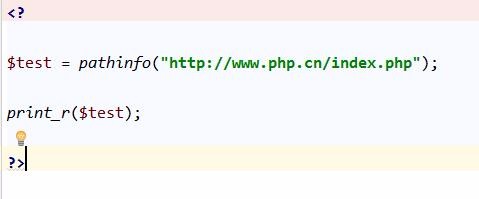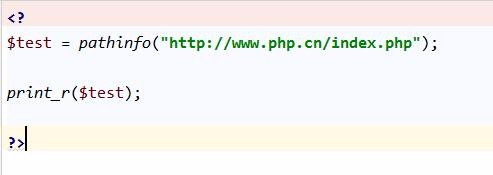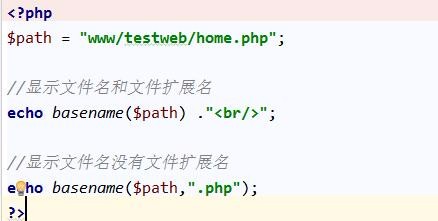
In php, there is a built-in function pathinfo, which can easily obtain the file extension, file name and other information! The function of the pathinfo() function is to return file path information in the form of an array. This article has compiled some usages and examples of the php pathinfo() function. I hope it will be helpful for everyone to understand the pathinfo() function. 1. Detailed explanation of the php pathinfo() function to obtain file path information. The function of the pathinfo() function is to return file path information in the form of an array. This article mainly introduces some syntax parameters of the php pathinfo() function. pathinfo() returns an associative array containing path information. Includes the following array units: dirname, basename and extension. You can specify which units to return via the options parameter. They include: PATHINFO_DIRNAME, PATHINFO_BASEN
1.php pathinfo() function to obtain file path information usage summary

Introduction: In PHP, there is a built-in function pathinfo, which can easily obtain the file extension, file name and other information! The function of the pathinfo() function is to return file path information in the form of an array. This article has compiled some usages and examples of the php pathinfo() function. I hope it will be helpful for everyone to understand the pathinfo() function.
2.Explanation on using php pathinfo(), parse_url(), basename() functions to parse URLs

Introduction: PHP functions pathinfo(), parse_url() and basename(), these three are all functions for parsing URLs, but there are some differences. This article Some examples are listed. I hope that these examples will help everyone understand the usage and techniques of these three functions more easily. Let’s take a look:
3.dirname in php , the difference and examples of basename, pathinfo functions

##Introduction: Get the path and directory of the file in php Or file name, we often use the three functions dirname(), basename(), and pathinfo(). These three functions have been introduced in the previous article. This article mainly introduces these three functions to you in detail. Differences and usage examples.
4.Detailed explanation of the php pathinfo() function to obtain the path, name and other information of the file

Introduction: In PHP, it is very easy to obtain the path, name, or extension of a file through functions. You can use dirname(), basename(), pathinfo() and other methods to obtain the corresponding information.
5.Detailed explanation of the usage of php basename() function to obtain the file name

Introduction: We talked about how to use the php pathinfo() function to return the file path information. The php dirname() function returns the directory part of the file path. This article mainly introduces the use of php basename. () function returns the file name part of the path.
6.Detailed explanation of the php pathinfo() function to obtain file path information

Introduction: What does the pathinfo() function do? In PHP, the pathinfo() function is used to return file path information in the form of an array. His syntax is as follows:
7.php uses the functions pathinfo(), parse_url() and basename() to parse the URL_php instance
Introduction: As we all know, the functions pathinfo(), parse_url() and basename() in PHP are all functions for parsing URLs, but there are some differences. Some examples are listed below. Through the examples, we can learn more It is easy to understand the usage methods and techniques of these three functions. Friends in need can refer to them. Friends who are interested can learn together below.

## Introduction: PHP has been updated to many versions, and the one that is used more recently is PHP5. Below we have summarized the common functions of PHP5 for you so that you can check them when actually writing code in the future. pathinfo returns file path information, including the following array units: dirname, basename and extension. func_num_args(), func_get_arg(), func_get_args() glob — Find file paths matching the pattern gzcom...
9..htaccess Hide index.php and use pathinfo Resource file path errors are not reported
Introduction: My .htaccess file configuration {code...} accesses local.com/admin/index and parses the resource file local correctly. com/admin/index.css, the resource file is regarded as a PATH_INFO request. If this CSS file does not actually exist, a 404 error will be reported. But now it returns 200...
10.PHP routing implementation principle, please give me some advice
Introduction: After using the framework for a while, I suddenly realized that it seems that the core of the MVC framework is routing. Can you please enlighten me on the specific principles? For example, TP5 routing is very powerful, but the source code has basically no comments. After reading it for 2 hours, I still don’t understand the whole process. How it is. All I can do now is the pathinfo step...
[Related Q&A recommendations]:
php - Who can introduce it to me? cgi.fix_pathinfo This so-called vulnerability, how did I find out that there is no such problem~~
Server configuration - How does nginx support pathinfo mode?
How to set up nginx to support pathinfo
thinkphp - Some questions about php's pathinfo
url - .htaccess hides index.php and uses pathinfo, causing css js loading errors
The above is the detailed content of 10 recommended articles about the php pathinfo() function. For more information, please follow other related articles on the PHP Chinese website!




